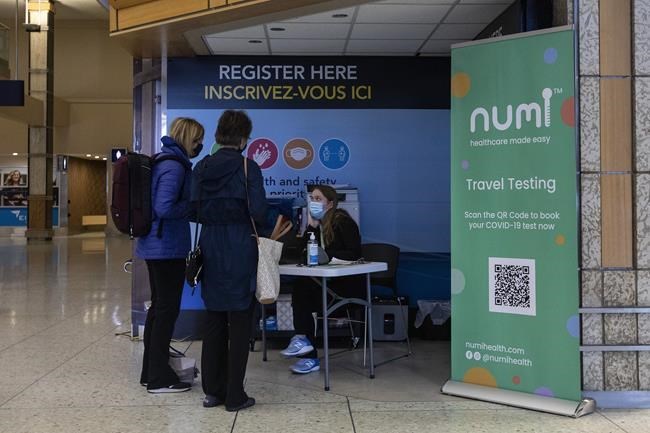
Passengers inquire about COVID-19 testing at the Edmonton International Airport in Edmonton Alta., on Thursday December 2, 2021. THE CANADIAN PRESS/Jason Franson
Republished June 21, 2022 - 1:23 PM
Original Publication Date June 21, 2022 - 11:01 AM
TORONTO - Robyn Skrepnyk says she thought the federal government's suspension of the vaccine mandate for domestic and outbound travel would finally allow her to use an $800 airline credit for a summer trip abroad.
But even after the new rules came into effect Monday, Skrepnyk doesn't see herself straying too far from her Edmonton home any time soon.
The 14-day quarantine unvaccinated Canadians must complete after they re-enter the country has proved to be prohibitive for the international getaway Skrepnyk had hoped for, she said. While she's allowed to travel more freely within Canada, Skrepnyk said there are no domestic destinations she'd want to fly to.
"I may have four weeks of holidays at work, but I can't take three weeks off at a time to go on a one-week vacation out of the country," said Skrepnyk, who chose not get vaccinated. "I'll just take my vacation, I guess, and stay home and hope to heck I can get my money back."
Although experts expect relaxing Canada's travel rules willbe a boon for the domestic tourism sector, they note the continued requirements for unvaccinated Canadians crossing the border could limit their ability to roam abroad.
The vaccine mandate was lifted Monday for domestic travellers on passenger planes, trains and buses. Federally regulated airline and airport employees are also allowed back on the job after being put on unpaid leave because of their vaccination status.
Unvaccinated Canadians travelling outside the country still have to quarantine for 14 days upon return. They must also take COVID-19 tests before their flight, upon arrival and on the eighth day of their quarantine. Daily COVID-19 self-assessments must be done through the ArriveCan app, and screening officers may check in by email, phone or visits.
Meanwhile, most foreigners who have not been jabbed remain barred from entry.
Marty Firestone, president of insurer Travel Secure, predicted that the regulatory changes will result in a dramatic increase in domestic travel as a swell of unvaccinated Canadians look to explore their own country.
While this is good news for Canada's pandemic-strained tourism industry, this new segment of eligible fliers may exacerbate the logjam at airports, said Firestone.
He worries the quarantine and testing requirements in particular are bound to bring complications and compound long queues at customs.
"I think it's going to confuse matters even more," he said. "They've kind of done a strange thing in allowing you to leave unvaccinated but no change in coming back. That's going to be a nightmare waiting to happen."
Government officials have repeatedly said that COVID-19 restrictions aren't to blame for airport congestion and flight delays, insisting that any revisions were made in the interest of public health rather than ease of travel.
"While the suspension of domestic vaccine mandates reflects an improved public health situation in Canada, the COVID-19 virus continues to evolve and circulate in Canada and globally," Public Health Agency of Canada spokeswoman Tammy Jarbeau said in an email.
"Given this context, and because vaccination rates and virus control in other countries varies significantly, current vaccination requirements at the border remain in effect."
Dr. Zain Chagla, an infectious diseases physician at St. Joseph's hospital in Hamilton, was skeptical of the public health benefits of forcing returning unvaccinated travellers to quarantine for 14 days. He noted that's longer than the isolation requirements for people who test positive for COVID-19 in many parts of Canada.
Viruses don't recognize borders, said Chagla, so the risk of an unvaccinated person flying from Toronto to Montreal doesn't meaningfully differ from a Toronto to New York trip. There also isn't much reason to believe that quarantine requirements will prevent people from catching or spreading the novel coronavirus at a local venue or gathering, he added.
While research shows that COVID-19 vaccines provide significant protection against severe illness, Chagla said emerging evidence suggests that two doses and a booster provide little protection against Omicron infection.
Given what we know about how the virus is evolving, potential new variants will likely be better at evading immunity, he said.
"The variants are going to come into vaccinated people one way or another," he said. "Bottom line is that everyone should be allowed to come in over the border, and the systems in place really don't add much."
Unvaccinated travellers must also be mindful of border restrictions at their place of destination, said Richard Vanderlubbe, CEO of travel agency Tripcentral.ca.
Entry requirements for unvaccinated visitors, such as mandatory COVID-19 testing, in other countries are often complex and subject to change on short notice, said Vanderlubbe.
He said his agency has devoted much of its marketing budget to keeping customers apprised of these rules. But for the foreseeable future, Vanderlubbe said, it might be prudent to pick the most flexible option when making travel arrangements, rather than defaulting to the lowest fare.
"It should be a more considered purchase maybe than it was in the past," he said. "But certainly for vaccinated Canadians, nothing's changed. And for unvaccinated Canadians, there's more options."
This report by The Canadian Press was first published June 21, 2022.
News from © The Canadian Press, 2022